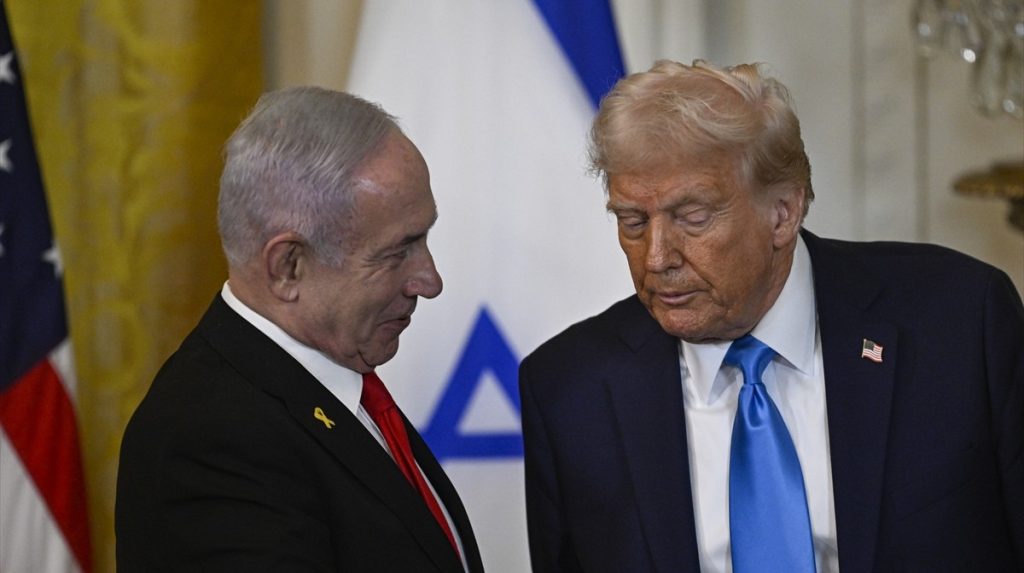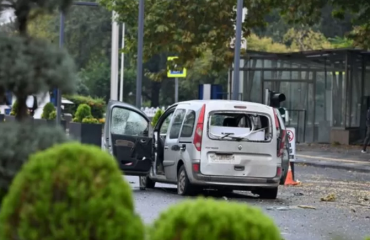

Trump promised to solve the Gaza and Ukraine problems without breaking a sweat, but he failed to get his word listened to by Netanyahu.
At times, history compresses into weeks, and some rare nights carry the burden of decades. June 13 might just have been one of those nights. That’s when Israel struck Iran in a bold, chilling, and calculated move. Missiles flew, tensions spiked, and the post-post-Cold War order shuddered. But beneath the noise, five brutal and illuminating lessons emerged — not just for Tel Aviv and Tehran, but for Washington, Ankara, and every capital trying to navigate the 21st century’s perfect storm of disorder.
Let me try to unpack what we’re learning— fast and painfully.
Lesson One:
The new world order isn’t being negotiated — it’s being fought over.
You can call it a “convergent transformation” or call it a breakdown in history. When the way we live, produce, communicate, and govern all shift at once, as is happening now. Systems don’t crumble at once. Things bend and snap, putting considerable strain on the entire socio-political and economic system, often with a sound no one wants to claim they heard.
From AI revolutions to climate pressures, the global system is mutating in real time. We’ve seen this movie before: significant disruptions that no one could manage without a war, and sometimes not even then. The last time the world saw such total systemic disruption ended with trenches and, eventually, mushroom clouds. This time, the trigger wasn’t a bullet in Sarajevo but a reality TV presidency in Washington. Donald Trump’s election in 2016 didn’t just shake up America — it accelerated a global unraveling.
And Israel’s strike on Iran? It may well be the latest crack in a world trying to give birth to a new order.
Lesson Two:
Trump cannot broker what he doesn’t – and probably is not interested in – understanding.
Donald Trump once boasted he could bring peace to Gaza and Kyiv by sheer force of his “irresistible” charisma and “big, beautiful” wisdom, without breaking a sweat. Turns out he can’t even get Benjamin Netanyahu to return, much less heed, his calls. The Israeli strike was a rebuke not just of Iran but of Trump’s fantasy that he could coerce peace by being mean and shouting louder than the other guy.
Worse, Trump is deeply allergic and thin-skinned when it comes to failure. If Iran drags its feet, expect Trump, in typical fashion, to double down on Israel, not because it’s a good strategy, but because he hates looking weak.
There’s a bigger point here: Populist leaders with shallow intellectual foundations and oversized egos don’t do nuance. They do soundbites. Tend to substitute spectacle for substance. When the world is on fire, that’s not just unhelpful — it’s dangerous.
The civic axiom is that betting and believing the future of global politics on someone who has probably not even read a serious book in their life is nothing short of absurd.
Lesson Three:
Netanyahu will burn the house down to stay in it.
Netanyahu has once again reminded the world that when his political survival is on the line, nothing—not Gaza, not Tehran, not global stability-is off-limits.
It is the same playbook we’ve seen from other desperate incumbents: distract, escalate, cling. What is happening with Netanyahu is a stark reminder that leaders who care only about holding onto power (even if democratically elected) can be incredibly damaging to their countries.
Yes, Netanyahu and other autocrats of our time are all elected. However, it should always be remembered that democracy is a system, a process, not a destination, but a mechanism, an ever-evolving framework that equips us with the means of governing, not guarantees good governance. What matters is what you do with it.
And what Netanyahu is doing is terrifying.
There is also a meta-lesson: If corruption scandals and legal battles are your biggest motivators, foreign policy becomes a smokescreen, not a strategy. Don’t expect peace from leaders fighting for their immunity.
Lesson Four:
Iran is looking more like a paper tiger than a regional power.
Here’s another interesting inference about that Israeli strike: the intelligence behind it was surgical, and the way it was executed commands frightening accuracy. One is tempted even to say, too good. Iran’s defenses, practically almost the entire security apparatus, are riddled with holes. And its response options? Blatantly limited. Militarily, it’s now reconfirmed that Israel’s capabilities vastly exceed Iran’s ability to retaliate. Israel didn’t just strike hard — it hit with confidence, precision, and a message: We know where you live and when you sleep.
The result? Tehran’s regime is being unmasked — less a roaring lion, more a hollow shell. The latest events add up to the ballooning inventory of humiliations that Iran continues to suffer at the hands of Israel. If the slide continues, Iran could lash out not with calculation but desperation. I’s choice of action could come recklessly and violently rather than rationally. Watch Iraq and Syria closely. Assuming a more aggressive posture, that’s where Tehran might look to reassert dominance in foreign policy. At this juncture, what also stands out is that even Iran’s traditional proxies seem to have left it isolated.
Closed regimes that lack broad public support and prioritize their survival over improving citizens’ quality of life, no matter how much brute force they can wield or how significant their geopolitical or historical depth, ultimately fail to maintain social cohesion or ensure national welfare and security.
That is the primary reason why Israel finds gathering HUMINT on Iran almost criminally simple!
The more profound truth is that time is never on tyranny’s side. You can’t keep a country running—or safe—if your citizens have checked out and your only tool is repression. Trying to govern a country through authoritarianism by stifling society and denying individual rights and diversity is a practice doomed to expire. You cannot suppress society and expect stability. Autocratic regimes built on fear, not consent, eventually collapse under their own weight.
Lesson Five:
Türkiye is walking a tightrope in an increasingly destabilized region.
If the crisis festers, Türkiye risks being lumped in — again — with a region seen by investors as risky, volatile, and unstable. That’s bad news for a country battling inflation, currency volatility, and geopolitical whiplash.
But here’s the twist: if Türkiye plays its cards right, this chaos could still be its pivot point.
Fix the structural issues — even modestly — and Türkiye could be poised to benefit from the post-crisis reordering. Think supply chains, energy corridors, new trade alliances, commercial and foreign investment opportunities. Also, the “imposed,” even expected, bar for credibility may well not be sky-high. In such a geopolitical environment, a little bit of reform can go a long way. It could well morph into a political windfall for the ruling government —an unexpected feast nourishing its domestic standing when it needs it the most.
Even if this conflict doesn’t escalate, Türkiye may still have an opening. The size of the prize, though, will hinge on three things: how well Ankara manages its relationship with Washington, how creatively it recalibrates its standing with Israel, and — perhaps most critically — how far it’s willing to go on the home front when it comes to political inclusivity. Navigating these challenges demands strategic clarity over emotional reflexes.
One sensitive detail
And let’s be clear: inclusivity in Türkiye isn’t just a “Kurdish issue.” It’s about whether the government is ready to build a 21st-century social contract that works for all its citizens, secular or religious, urban or rural.
But there is a catch: every move Türkiye makes in that direction will come with a domestic political cost. And in Turkish politics, where polarization is a national sport, that cost can be steep.
Also, don’t isolate this moment. What happens next in Syria, Ukraine, and the increasingly tense Russia–U.S. chessboard will ripple across the region and may offer Türkiye solid geopolitical and geo-economic opportunities that still need to be prudently managed.
So, what immediate risks should be monitored for Türkiye in light of the escalating tensions between Iran and Israel?
I will highlight three issues, which are mainly related to the Turkish economy’s vulnerability to external shocks.
Three challenges for Türkiye
The first is well-acquainted for seasoned observers of the country’s economy: a sharper-than-anticipated slide in the value of the lira, particularly against the U.S. dollar—a currency that tends to strengthen whenever geopolitical anxiety climbs. Such a move would place real strain on Ankara’s current economic program, which leans heavily on an informal—but—deliberate effort to manage the lira’s exchange rate without admitting as much.
Rising oil prices will be another looming risk for Türkiye if the crisis persists and escalates. As global energy costs surge, Türkiye’s already fragile current account could take another hit—and now, the pain could be structural, not just seasonal.
Then there’s the third challenge—seemingly less tangible but equally consequential: a narrative vacuum. This isn’t just a rhetorical or branding problem. It reflects deeper structural issues that have yet to be addressed. Türkiye still lacks a compelling narrative that positively decouples it from its regional and international peers, one that signals long-term resilience to investors and partners. Hence, its immunity against the drift caused by increasing turbulence in its neighborhood is scant.
Final Thought:
The window is narrow, and the clock is ticking.
Türkiye’s best potential short-term lever? A special relationship with the United States. But those come with strings, and Washington may soon expect more than polite alignment.
This moment is messy, dangerous, and unpredictable. But it’s quite possibly also a rare hinge — the choices made now can have powerful long-term effects.
In the short term, Türkiye may struggle. In the medium term, it may rise. And in the long run, as with everyone else, it will face the brutal test of whether it can ride the next wave — or be swallowed by it.


